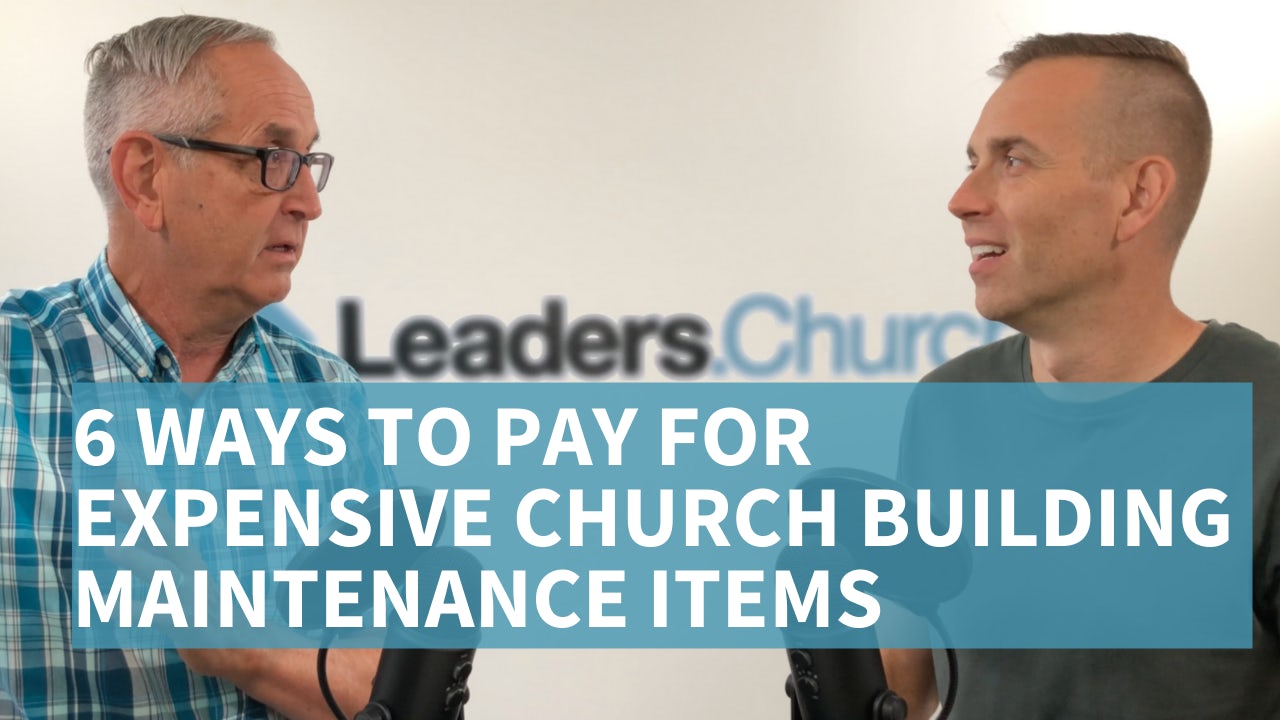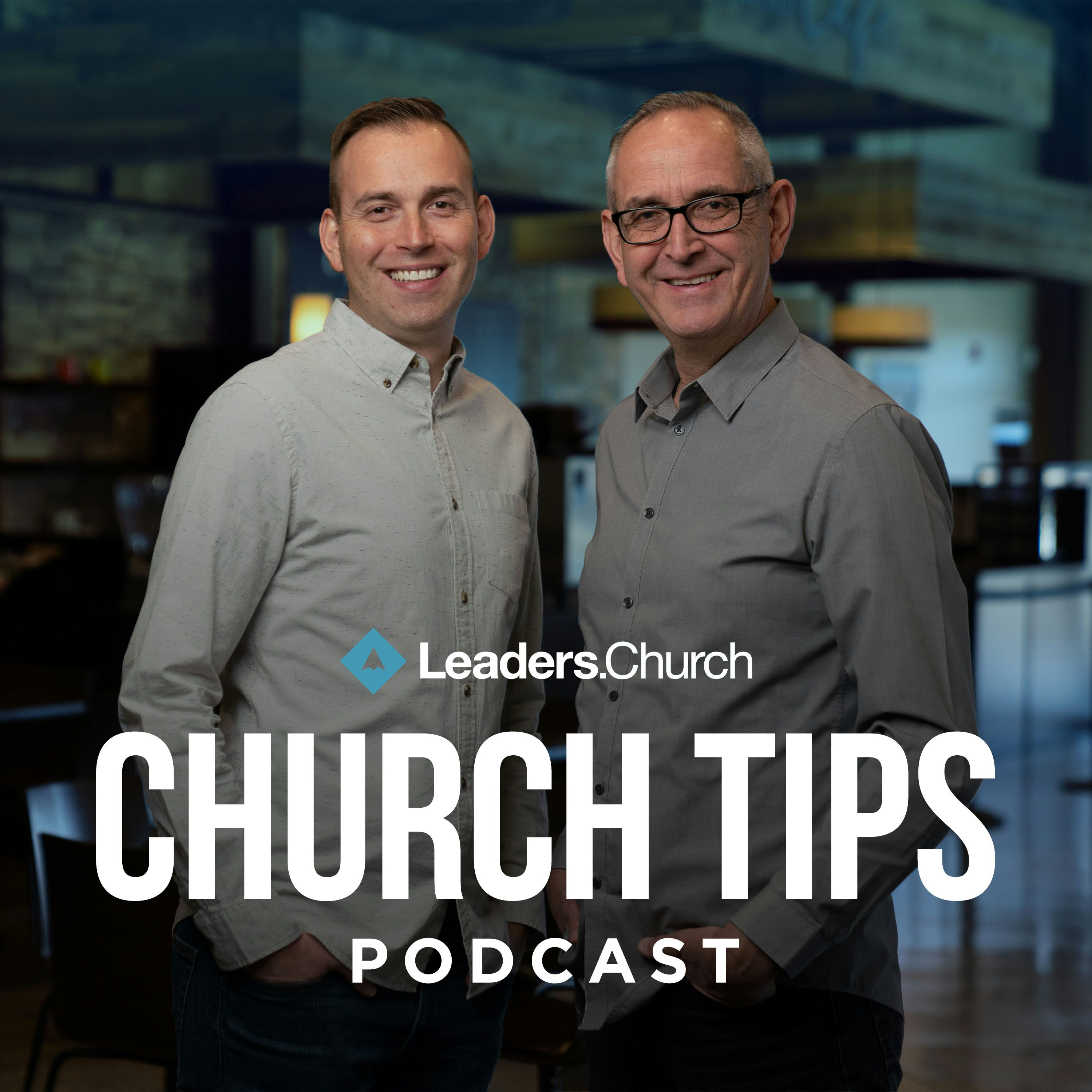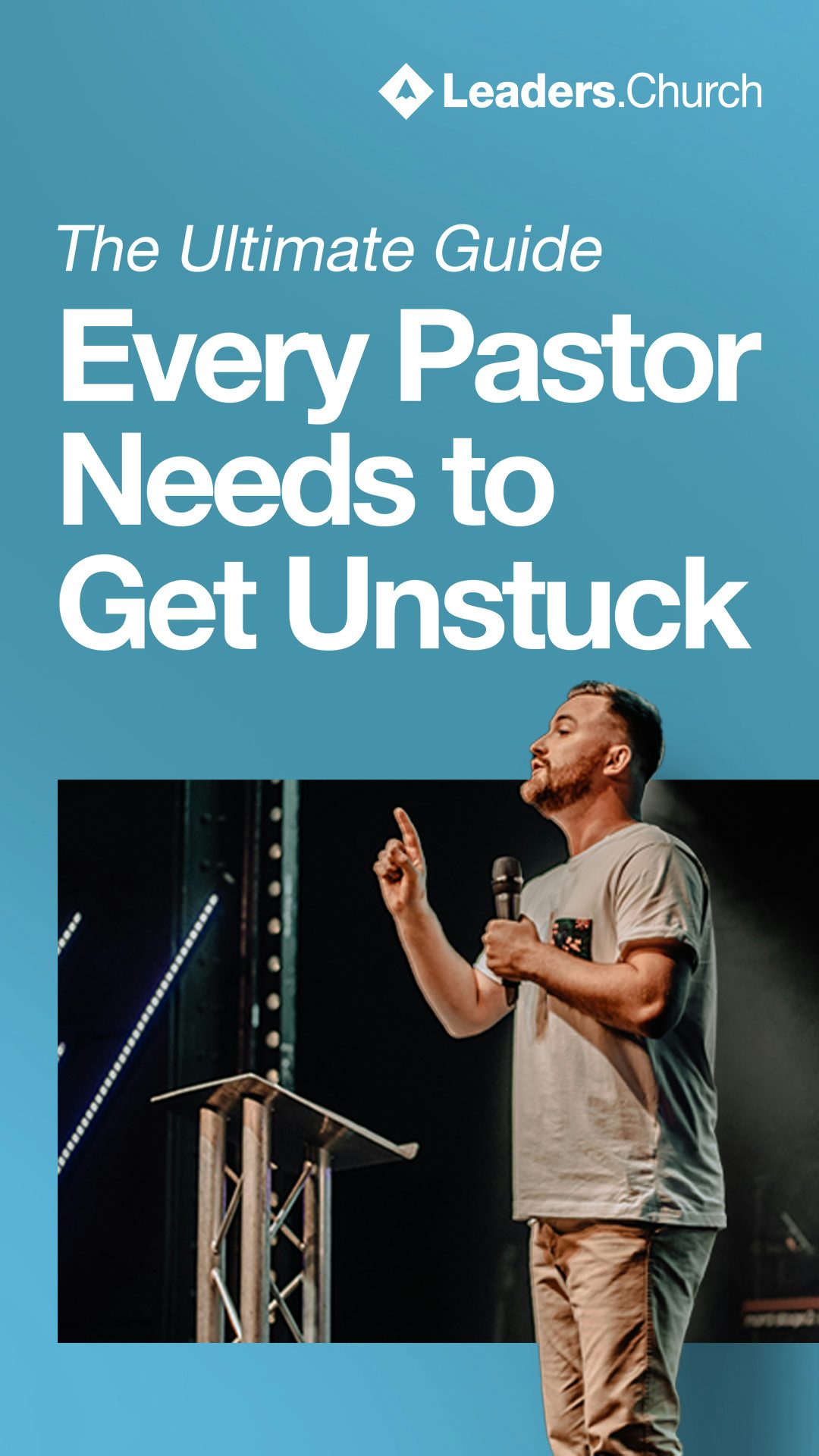026 – 6 Ways to Pay for Expensive Church Building Maintenance Items
What’s in this Episode?
Oh, you’ve got to be kidding me. We’ve got to replace the roof this year? And that crumbling parking lot? And oh, by the way the HVAC system is going out. Why do I have to deal with these as a pastor? I’m supposed to be the visionary leader who can pray and preach and cast vision and I’ve got to deal with these big ticket maintenance items. How do I do that? In today’s episode of Church Tips, we’re going to go right into the heart of how you as a leader can help pay for and plan for those big ticket items. Here are 6 ways to pay for expensive church building maintenance items.
Read the Transcript
Dick Hardy 0:44
Back in the day, I was part of a major construction project of a new sanctuary unit and related offices and kids ministry areas and so on. And this building was a big sanctuary in the middle and then it had four different segments on it. It had a prayer classroom segment, it had a worship music segment, an office segment, and a nursery segment. You’ll remember those how that all laid out. Well over the office segment of our unit was all the air conditioning stuff so it’s sitting up there, this monster size unit sitting up there and that roof on that segment, not the other three or the big one, but on that segment leaked all the time and it leaked right down to the workroom. So here you got your copier, and all the stuff and the workroom stuff. And the people are in there trying to work. It’s leaky whenever it’s raining and we’re constantly spending money on trying to fix that roof. And guess what? That was not cheap. That is not just, “oh, we have to buy some extra paperclips here.” So the question comes up when you’re dealing with that, what do you do when you’re dealing with this, what I call, big ticket items? You don’t do them every day of life, but periodically you got to put a roof on, periodically you have to resurface the parking lot periodically, you got to do big things that don’t happen every year, but they do happen from time to time and that comes with having a building.
Jonathan Hardy 2:14
Well today we want to talk about six ways to pay for these expensive church building items.
Dick Hardy 2:18
Oh, you have to pay for that?
Jonathan Hardy 2:19
I know yeah, somehow you gotta pay the bills. So we’re going to talk about how do you do that? What are some ways you can do that?
Tip #1: Plan Ahead
Jonathan Hardy 2:26
And the first one I want to jump into is simply to plan ahead. Here’s the reality. There’s going to be expensive items coming your way whether or not they’ve hit yet, they are coming. So you have to plan ahead. You have to set money aside every month. That’s what I encourage you to do is set money aside every month. This is like a non negotiable. So if you look at your current budget, and you say the money coming in, is the same amount as the money going out and you’re not factoring in for savings for something big, you are headed toward destruction, because you’re not going to build afford something big when it comes. And so you’ve got to figure out how to trim some things back. So that way you are putting that money aside, every month is ideal, for the big items that are that are coming. And then also, as it relates to planning ahead, you might even try to schedule some things on the calendar. So you know, “hey, we’re going to be doing some sort of maintenance here coming this summer, or we’re going to be doing something in the fall.” And so that way you can plan not only budgetarily, but you can plan just with the actual calendar and maintenance of things so that you might even be able to prevent some of those unexpected things from coming.
Dick Hardy 3:37
Well, I can tell you, if you’re not planning like this, here’s what’s going to happen, and your living hand to mouth, you’re going to reach that point two years from now when you got to replace that roof, or that AC unit or something. And all of a sudden, you gotta have the money. And you’re gonna end up borrowing the money. And that’s a loser to be borrowing for maintenance things. You don’t want to be doing that. So I cannot encourage you enough to plan ahead. Second one Jonathan?
Tip #2: Coach The Church Board
Jonathan Hardy 4:02
Yeah. Second thing is you want to coach the church board on this whole thing. So you’re the one who’s leading the financial effort. You’re like the CFO, so to speak. And so you have to be able to help them understand and a lot of these guys or gals, they might be businessmen or they’re, you know, so they may understand this, but not everyone is. And so whatever, whoever it is, whoever makes up your church board, you have to make sure you tie the spending to the mission. And so even on a frustrating roof leak, how can we tie that to mission? You have to be thinking about all that all the time, because then when people, when the board members, see okay, well this big expense, you know, we need to do this because this is going to help us do XYZ and even if it’s not a fun expense, tie it to the mission.
Tip #3: Cultivate A Specific Donor
Dick Hardy 4:55
Exactly. The third one I’m throwing in here, this is a little bit unique and it’s one to be very careful with. And that is to cultivate a specific donor. Now normally, I’m going to go back to the first point, Jonathan mentioned, that you need to be planning ahead and you need to be doing big ticket maintenance items out of your general fund budget, or if you have a building fund budget that accommodates these kinds of things. You don’t want to be going to the congregation to say the roof leaks, now we had to take up an offering. Oh, the parking lots all cracked and we got potholes out there we’ve got to replace that is not what to do.
Jonathan Hardy 5:41
No one wants to give to that.
Dick Hardy 5:41
Because everybody feels like that’s a sinking ship when you’re doing that. However, there are times that the Lord will bring people to the church that have unique giftings in giving and you will want to be careful in how you cultivate that donor, but sometimes a donor will step up and say, I’ll take care of that. Not in a public way. You don’t want this to be, “oh, hey, we get to brag on how much money Joe gave,” and you’re doing that well in advance. So if you have to put a roof on in 2024 in, you know, April 2024, you’re not cultivating this donor in March, 2024. You’re doing that years in advance, but it is something that pastors need to be attuned to to develop this kind of a donor.
Tip #4: Create Budget Margin
Dick Hardy 6:34
Number four, is to create budget margin. So again, back to the very first point Jonathan talked about with planning ahead. If your income and outgo are the same, you’re headed for a disaster. You need to go and do things inside your budget now on all areas of ministry, all areas, all your line items in order to create that margin. Believe me a rainy day fund will be needed. You need to create budget margin. Never plan to spend all that you take in. That’s bad. To do that, personally, to do that with the church, is a loser all the way around.
Tip #5: Reallocate Budgeted Expenses
Jonathan Hardy 7:14
The next thing you want to do is reallocate budgeted expenses. So you want to be careful here, but there may be a point as you’re getting ready to need to make some big expenses, pay for some big expenses is you might have to reallocate some things and so that means going through and trimming some. Maybe you trim a little bit off of each of the line items of your church’s budget. Or you might take big chunks from just a few areas, you know, you could kind of look at it from two different ways, you know, maybe just do a flat 10% cut on all areas or you just really trim back and change your strategy for a few of those line items that you had. And, so in either case, you might need to reallocate those. Now, one of the things We talked about in episode seven is how to balance the church budget. And when it’s all said and done, you still have to balance it. And that’s the tricky part. Otherwise, you’re borrowing. And the whole goal here, even in this episode, is to help you not have to borrow money for maintenance things. And so you want to make sure to check that one out.
Tip #6: Defer One Year
Dick Hardy 8:19
Exactly, exactly. The last item we want to talk to you about is to defer one year. Now, again, how do I get the ones that you always have to be careful with? The deferring one year is… I mean, clearly, if water’s coming in from the roof, you don’t defer that a year. But let’s take the parking lot. Your parking lot’s old, it’s cracked, you’re developing potholes. Maybe there are some things you could do this year and you say, “okay, listen, if we could defer this one more year, we’re going to be in a better position.” And that could be true. If you defer one more year, then you better take the steps that will drive you to be in the position next year to do what you say you’re gonna do. Otherwise, if you don’t do anything different, you’re gonna be sitting here one year from now and you’re in the same boat. So if you defer a big ticket, big maintenance item a year, which is legit. Just be sure you’re setting the money aside during that year to strengthen your position at that time.
Jonathan Hardy 9:23
And let me interject to, that you want to make sure that you select the right thing to defer. You and I actually took a couple of my kids out for a bike ride yesterday. And we went on a bike ride, and I actually pointed out to Dick and I said, “hey, we need to do an episode on this.” Because this is an area that churches need to know about. Now, I don’t want to go into the whole episode. We’re going to save this for another episode. But this church, the building was nasty, dirty. Oh, just just filthy dirty. I mean, it’s just like unacceptable. Well, if you say, “well, we’re gonna delay this for another year…”
Dick Hardy 10:03
Now, we’re not talking broken, we’re talking dirty. The building was dirty.
Jonathan Hardy 10:06
Yeah, just needed to be cleaned. Now it’s going to cost. You’re going to have to power wash and do some things. So you’re there’s going to be some expense involved. Well, if you defer that another year, you know, I guess I just look at it and say, “why would I want to go to a church that doesn’t look like they take care of stuff?”
Dick Hardy 10:23
Yeah. They don’t take care of things. So you’re going to lose by doing that.
Jonathan Hardy 10:27
Yeah. So you have to think through what are the things that you’re not going to lose? Now, in the next episode, actually, we’re going to be talking about the first three places to cut the church budget. If you need to cut, what are some things you can do right away that are going to help you when it comes to determining the budget? So you’ll want to make sure to check that episode out. The next episode that’s coming out, so what else?
Recap:
Dick Hardy 10:50
Okay, well, let’s just do a little recap here. You know, we’ve got these five things that we talked to you about. Number one, which is probably the monster one of all, plan ahead. Budget ahead, set your money aside and you’re going to be really glad you did. Coach the board, cultivate a specific donor, create budget margin and defer one year when absolutely necessary. If you’ll do these things, you’re going to be well on your way to being able to have the money set aside to really be able to take care of these big expense items.
Jonathan Hardy 11:23
Yep. Well, we want to again mention that the Kids Ministry Track did release this week. So we are so excited about this online course. It’s part of our Church University courses for pastors.
Dick Hardy 11:35
churchuniversity.com
Jonathan Hardy 11:37
Yeah, go to churchuniversity.com, you’ll be able to get all the information, you can sign up, it’s perfect for your kids pastor, whether they’re a paid staff member, or a volunteer kids ministry leader.
Dick Hardy 11:47
Huge huge discount on this launch right here so take advantage of it.
Jonathan Hardy 11:50
Yeah, we just released it on Wednesday and so this is the perfect time to get it and grab your copy. 44 video course and so make sure to check that out. As well, I want to encourage you to subscribe. If you have not yet subscribed, please subscribe on YouTube or on podcasts. And please rate and review. We want to hear from you and get your feedback on this podcast. And so we look forward to producing more of these. And in the meantime, we’ll see you next time.
Subscribe & Follow:
- Subscribe on Apple Podcasts
- Follow on Spotify
- Subscribe to YouTube Channel
- Subscribe on Google Podcasts
- Like us on Facebook
- Follow us on Instagram
- Follow us on Twitter









